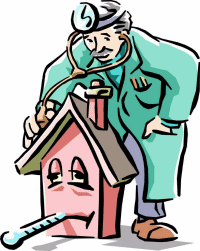Is Your Home Making You Sick?
The quality of your indoor air will have a positive or negative impact on your health because we spend 90% of our time indoors. Unfortunately, most people are not aware that the quality of their indoor air could be making them sick!
Health can be impacted by indoor pollutants such as formaldehyde, carbon monoxide, radon, asbestos, and of course, mold. Mold is one of the primary causes of asthma and many other allergy complaints.
You could have mold problems if your home has a history of water damage or leaks. Another clue that you may have mold issues could be that you feel healthier when you are outside of your home or work place. Pay attention to this clue because poor indoor air quality could be the cause of your ill health.
The World Health Organization (WHO) believes that poor air quality caused by water damage causes a condition known as Sick Building Syndrome (SBS) which is a chronic inflammatory illness referred to as Chronic Inflammatory Response Syndrome (CIRS).
According to Dr. Ritchie Shoemaker, the proper definition of CIRS is:
“an acute and chronic, systemic inflammatory response syndrome acquired following exposure to the interior environment of a water-damaged building with resident toxigenic organisms, including, but not limited to fungi, bacteria, actinomycetes and mycobacteria as well as inflammagens such as endotoxins, beta glucans, hemolysins, proteinases, mannans, c-type lectins and possibly spirocyclic drimanes, plus volatile ogranic compounds.”
“This illness happens after exposure to the interior environment of a Water-Damaged Building (WDB). There are many ways buildings become home to a toxic mix of microbes, fragments of microbes, and harmful chemicals. Buildings can host fungi, bacteria, mycobacteria, and actinomycetes as a result of construction defects like inappropriate ventilation; faulty construction of crawl spaces or inadequate building design; flat roofs or fake stucco cladding without adequate caulking; incomplete basements exposed to saturated ground water conditions; or not correcting water leaks.”
According to the MOLDY documentary released earlier this year, 28 percent of the population have genes that make them highly susceptible to mold-related health issues. This means that in the metro Atlanta area, approximately 1.5 million individuals are potentially susceptible to mold illness.
Symptoms often Reported with water-damaged buildings:
- Fatigue
- Weakness
- Muscle Cramps
- Unusual Pain
- Ice Pick Pain
- Headaches
- Light Sensitivity
- Red Eyes
- Blurred Vision
- Tearing
- Cough
- Sinus Problems
- Shortness of Breath
- Abdominal Pain
- Joint Pain
- Morning Stiffness
- Memory Issues
- Focus/Concentration Issues
- Word Recollection Issues
- Decreased Learning of New Knowledge
- Disorientation
- Skin Sensitivty
- Fibromyalgia
Because of the large number of symptoms and different combinations that a patient can have, CIRS is difficult to diagnose.
If you have been suffering from ill-health for an extended period of time and the treatments that you are prescribed do not seem to help, then contact Mold B Gone so that we can investigate your air quality and determine if mold is the cause.

